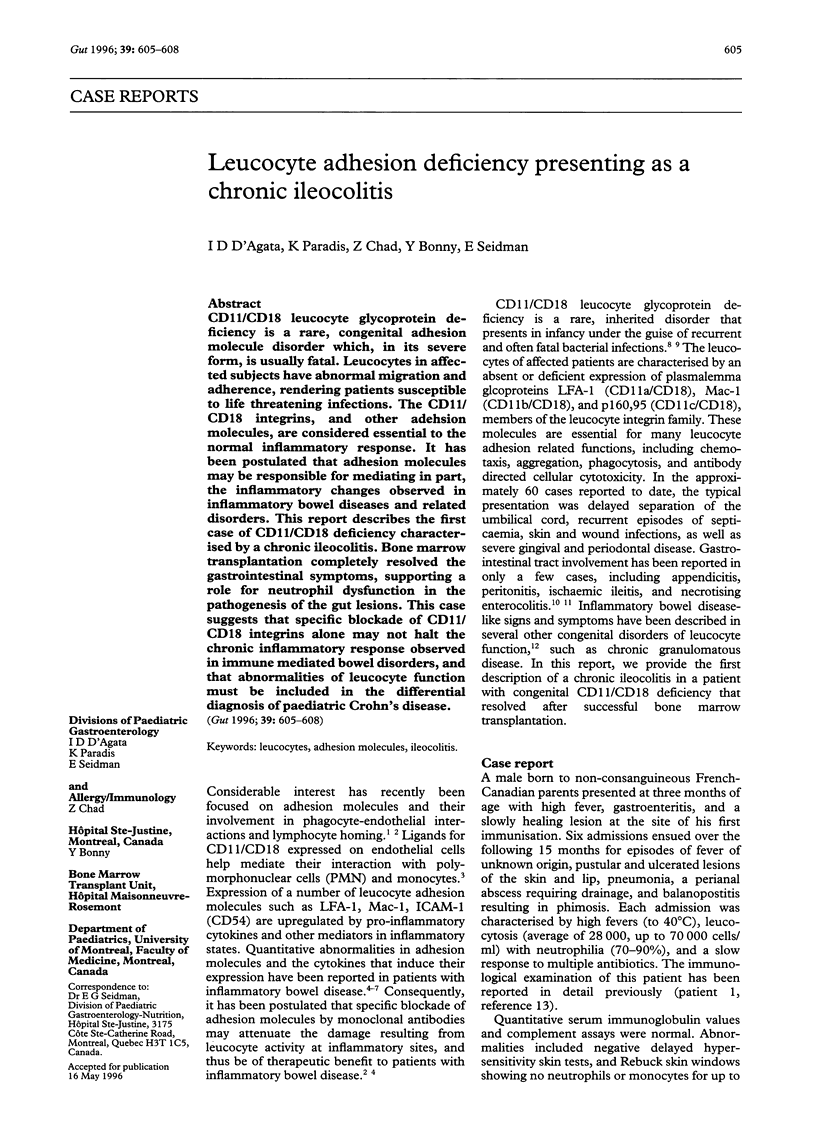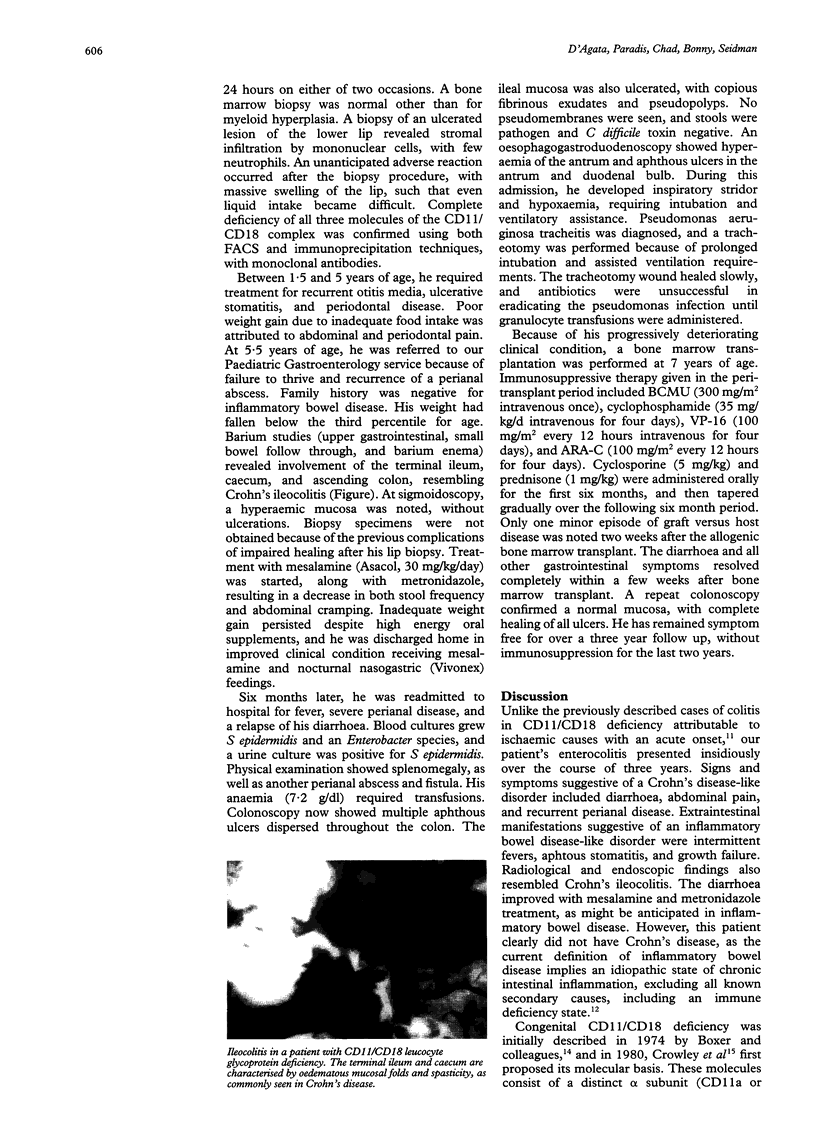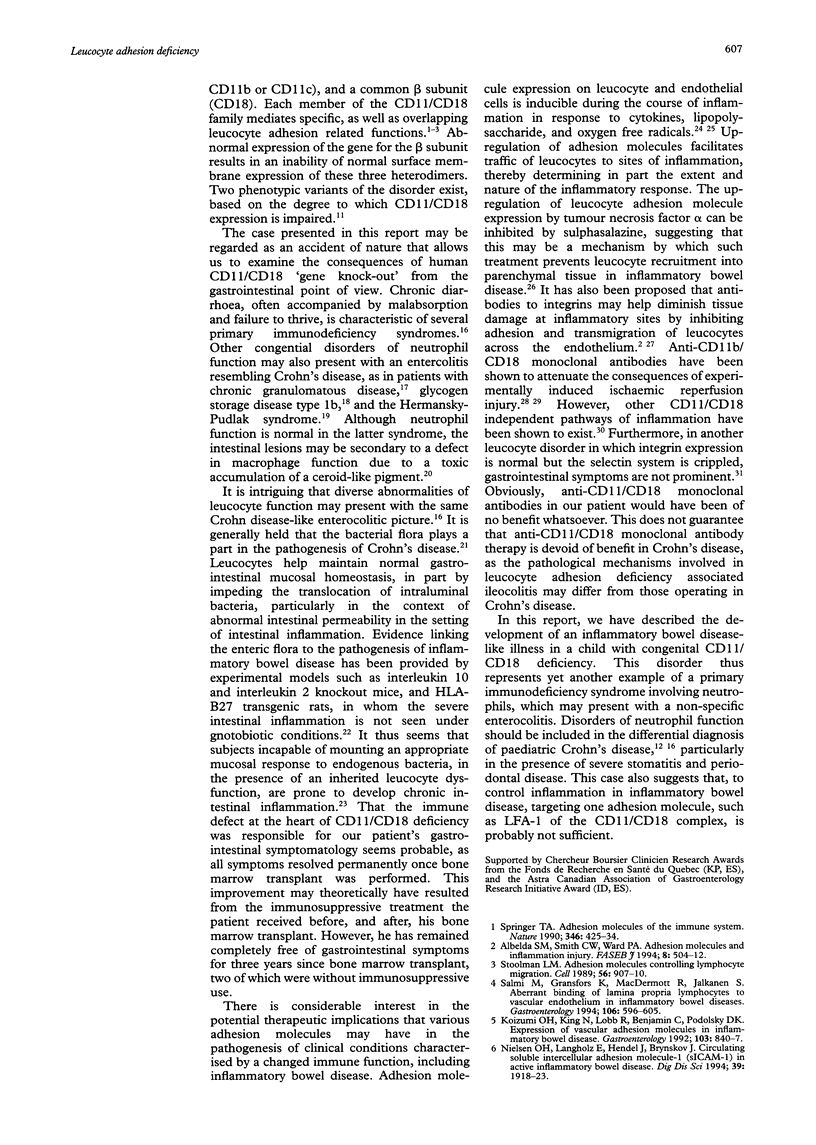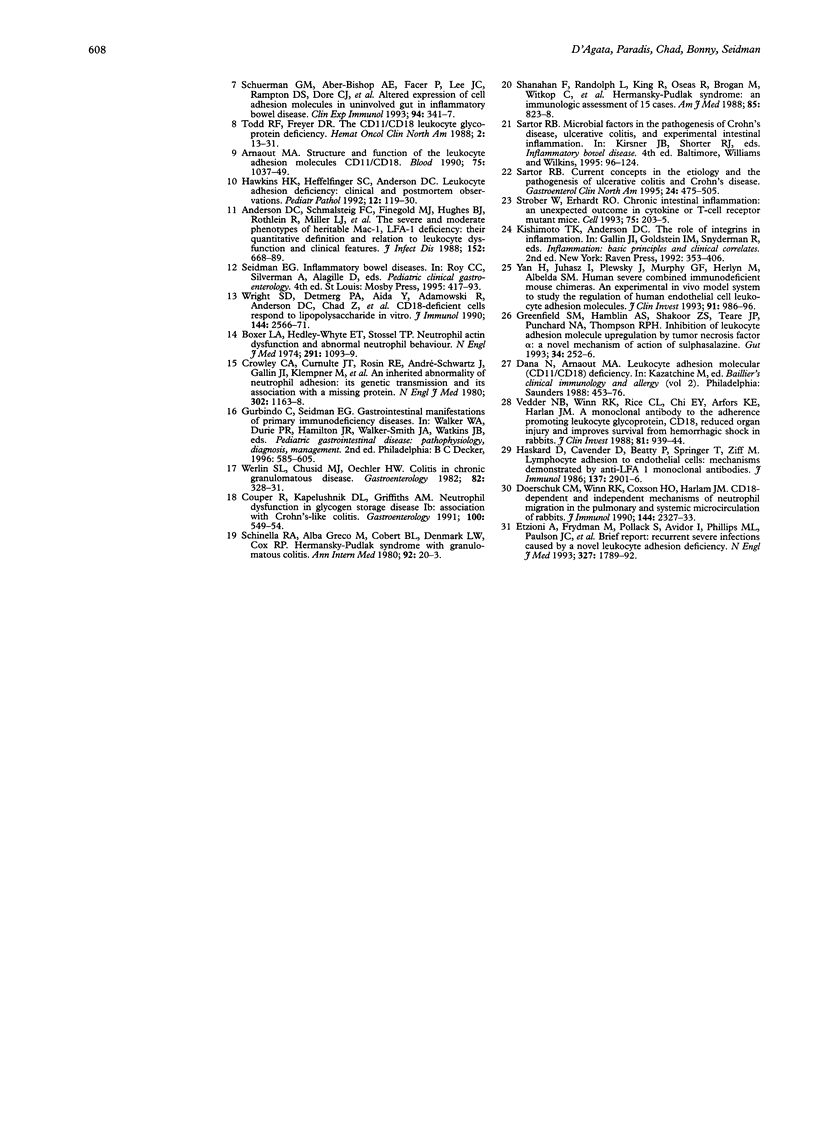Abstract
CD11/CD18 leucocyte glycoprotein deficiency is a rare, congenital adhesion molecule disorder which, in its severe form, is usually fatal. Leucocytes in affected subjects have abnormal migration and adherence, rendering patients susceptible to life threatening infections. The CD11/CD18 integrins, and other adhesion molecules, are considered essential to the normal inflammatory response. It has been postulated that adhesion molecules may be responsible for mediating in part, the inflammatory changes observed in inflammatory bowel diseases and related disorders. This report describes the first case of CD11/CD18 deficiency characterised by a chronic ileocolitis. Bone marrow transplantation completely resolved the gastrointestinal symptoms, supporting a role for neutrophil dysfunction in the pathogenesis of the gut lesions. This case suggests that specific blockade of CD11/CD18 integrins alone may not halt the chronic inflammatory response observed in immune mediated bowel disorders, and that abnormalities of leucocyte function must be included in the differential diagnosis of paediatric Crohn's disease.
Full text
PDF



Images in this article
Selected References
These references are in PubMed. This may not be the complete list of references from this article.
- Albelda S. M., Smith C. W., Ward P. A. Adhesion molecules and inflammatory injury. FASEB J. 1994 May;8(8):504–512. [PubMed] [Google Scholar]
- Anderson D. C., Schmalsteig F. C., Finegold M. J., Hughes B. J., Rothlein R., Miller L. J., Kohl S., Tosi M. F., Jacobs R. L., Waldrop T. C. The severe and moderate phenotypes of heritable Mac-1, LFA-1 deficiency: their quantitative definition and relation to leukocyte dysfunction and clinical features. J Infect Dis. 1985 Oct;152(4):668–689. doi: 10.1093/infdis/152.4.668. [DOI] [PubMed] [Google Scholar]
- Arnaout M. A. Structure and function of the leukocyte adhesion molecules CD11/CD18. Blood. 1990 Mar 1;75(5):1037–1050. [PubMed] [Google Scholar]
- Boxer L. A., Hedley-Whyte E. T., Stossel T. P. Neutrophil action dysfunction and abnormal neutrophil behavior. N Engl J Med. 1974 Nov 21;291(21):1093–1099. doi: 10.1056/NEJM197411212912101. [DOI] [PubMed] [Google Scholar]
- Couper R., Kapelushnik J., Griffiths A. M. Neutrophil dysfunction in glycogen storage disease Ib: association with Crohn's-like colitis. Gastroenterology. 1991 Feb;100(2):549–554. doi: 10.1016/0016-5085(91)90229-e. [DOI] [PubMed] [Google Scholar]
- Crowley C. A., Curnutte J. T., Rosin R. E., André-Schwartz J., Gallin J. I., Klempner M., Snyderman R., Southwick F. S., Stossel T. P., Babior B. M. An inherited abnormality of neutrophil adhesion. Its genetic transmission and its association with a missing protein. N Engl J Med. 1980 May 22;302(21):1163–1168. doi: 10.1056/NEJM198005223022102. [DOI] [PubMed] [Google Scholar]
- Doerschuk C. M., Winn R. K., Coxson H. O., Harlan J. M. CD18-dependent and -independent mechanisms of neutrophil emigration in the pulmonary and systemic microcirculation of rabbits. J Immunol. 1990 Mar 15;144(6):2327–2333. [PubMed] [Google Scholar]
- Etzioni A., Frydman M., Pollack S., Avidor I., Phillips M. L., Paulson J. C., Gershoni-Baruch R. Brief report: recurrent severe infections caused by a novel leukocyte adhesion deficiency. N Engl J Med. 1992 Dec 17;327(25):1789–1792. doi: 10.1056/NEJM199212173272505. [DOI] [PubMed] [Google Scholar]
- Greenfield S. M., Hamblin A. S., Shakoor Z. S., Teare J. P., Punchard N. A., Thompson R. P. Inhibition of leucocyte adhesion molecule upregulation by tumor necrosis factor alpha: a novel mechanism of action of sulphasalazine. Gut. 1993 Feb;34(2):252–256. doi: 10.1136/gut.34.2.252. [DOI] [PMC free article] [PubMed] [Google Scholar]
- Haskard D., Cavender D., Beatty P., Springer T., Ziff M. T lymphocyte adhesion to endothelial cells: mechanisms demonstrated by anti-LFA-1 monoclonal antibodies. J Immunol. 1986 Nov 1;137(9):2901–2906. [PubMed] [Google Scholar]
- Hawkins H. K., Heffelfinger S. C., Anderson D. C. Leukocyte adhesion deficiency: clinical and postmortem observations. Pediatr Pathol. 1992 Jan-Feb;12(1):119–130. doi: 10.3109/15513819209023288. [DOI] [PubMed] [Google Scholar]
- Koizumi M., King N., Lobb R., Benjamin C., Podolsky D. K. Expression of vascular adhesion molecules in inflammatory bowel disease. Gastroenterology. 1992 Sep;103(3):840–847. doi: 10.1016/0016-5085(92)90015-q. [DOI] [PubMed] [Google Scholar]
- Nielsen O. H., Langholz E., Hendel J., Brynskov J. Circulating soluble intercellular adhesion molecule-1 (sICAM-1) in active inflammatory bowel disease. Dig Dis Sci. 1994 Sep;39(9):1918–1923. doi: 10.1007/BF02088125. [DOI] [PubMed] [Google Scholar]
- Salmi M., Granfors K., MacDermott R., Jalkanen S. Aberrant binding of lamina propria lymphocytes to vascular endothelium in inflammatory bowel diseases. Gastroenterology. 1994 Mar;106(3):596–605. doi: 10.1016/0016-5085(94)90691-2. [DOI] [PubMed] [Google Scholar]
- Sartor R. B. Current concepts of the etiology and pathogenesis of ulcerative colitis and Crohn's disease. Gastroenterol Clin North Am. 1995 Sep;24(3):475–507. [PubMed] [Google Scholar]
- Schinella R. A., Greco M. A., Cobert B. L., Denmark L. W., Cox R. P. Hermansky-Pudlak syndrome with granulomatous colitis. Ann Intern Med. 1980 Jan;92(1):20–23. doi: 10.7326/0003-4819-92-1-20. [DOI] [PubMed] [Google Scholar]
- Schuermann G. M., Aber-Bishop A. E., Facer P., Lee J. C., Rampton D. S., Doré C. J., Polak J. M. Altered expression of cell adhesion molecules in uninvolved gut in inflammatory bowel disease. Clin Exp Immunol. 1993 Nov;94(2):341–347. doi: 10.1111/j.1365-2249.1993.tb03455.x. [DOI] [PMC free article] [PubMed] [Google Scholar]
- Shanahan F., Randolph L., King R., Oseas R., Brogan M., Witkop C., Rotter J., Targan S. Hermansky-Pudlak syndrome: an immunologic assessment of 15 cases. Am J Med. 1988 Dec;85(6):823–828. doi: 10.1016/s0002-9343(88)80028-7. [DOI] [PubMed] [Google Scholar]
- Springer T. A. Adhesion receptors of the immune system. Nature. 1990 Aug 2;346(6283):425–434. doi: 10.1038/346425a0. [DOI] [PubMed] [Google Scholar]
- Stoolman L. M. Adhesion molecules controlling lymphocyte migration. Cell. 1989 Mar 24;56(6):907–910. doi: 10.1016/0092-8674(89)90620-x. [DOI] [PubMed] [Google Scholar]
- Strober W., Ehrhardt R. O. Chronic intestinal inflammation: an unexpected outcome in cytokine or T cell receptor mutant mice. Cell. 1993 Oct 22;75(2):203–205. doi: 10.1016/0092-8674(93)80062-j. [DOI] [PubMed] [Google Scholar]
- Todd R. F., 3rd, Freyer D. R. The CD11/CD18 leukocyte glycoprotein deficiency. Hematol Oncol Clin North Am. 1988 Mar;2(1):13–31. [PubMed] [Google Scholar]
- Vedder N. B., Winn R. K., Rice C. L., Chi E. Y., Arfors K. E., Harlan J. M. A monoclonal antibody to the adherence-promoting leukocyte glycoprotein, CD18, reduces organ injury and improves survival from hemorrhagic shock and resuscitation in rabbits. J Clin Invest. 1988 Mar;81(3):939–944. doi: 10.1172/JCI113407. [DOI] [PMC free article] [PubMed] [Google Scholar]
- Werlin S. L., Chusid M. J., Caya J., Oechler H. W. Colitis in chronic granulomatous disease. Gastroenterology. 1982 Feb;82(2):328–331. [PubMed] [Google Scholar]
- Wright S. D., Detmers P. A., Aida Y., Adamowski R., Anderson D. C., Chad Z., Kabbash L. G., Pabst M. J. CD18-deficient cells respond to lipopolysaccharide in vitro. J Immunol. 1990 Apr 1;144(7):2566–2571. [PubMed] [Google Scholar]
- Yan H. C., Juhasz I., Pilewski J., Murphy G. F., Herlyn M., Albelda S. M. Human/severe combined immunodeficient mouse chimeras. An experimental in vivo model system to study the regulation of human endothelial cell-leukocyte adhesion molecules. J Clin Invest. 1993 Mar;91(3):986–996. doi: 10.1172/JCI116320. [DOI] [PMC free article] [PubMed] [Google Scholar]



